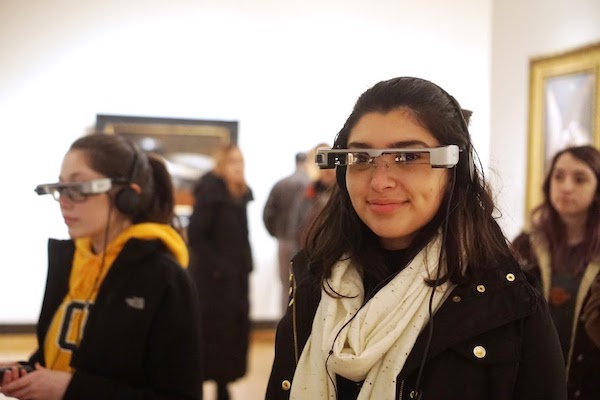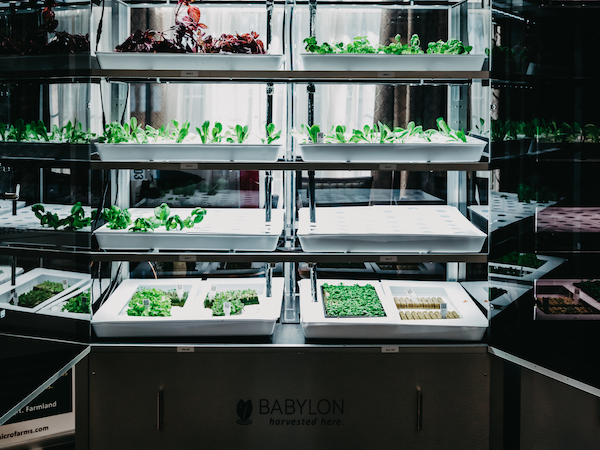
ARtGlass, a Shockoe Bottom-based augmented reality software firm, recently closed on a roughly $500,000 capital raise. (Courtesy of ARtGlass)
Armed with a fresh round of investor funding, a Richmond-based software developer plans to put the power to design augmented reality tours in the hands of its clients.
Meanwhile, a Scott’s Addition-based indoor farming startup is gathering some extra cash of its own.
ARtGlass has spent several years designing and developing tours for museums and historical sites, trade shows and tourism companies with its augmented reality software. That AR software is paired with third-party smart glasses or a mobile device and overlays video, text and images over the real-world objects observed through the devices.
In order to scale up the business, ARtGlass will get out of the driver’s seat with tweaks to its software intended to make it more user friendly so clients can build tours themselves.
The company recently raised approximately $500,000 to fuel a shift toward the software as a service model, and the funding haul will also help it target large operators who have hundreds of sites in need of AR-based tours.
Co-founder and CEO Greg Werkheiser said the pivot has been a year in the making and it’s expected to launch in March.
“The demand we have for work is huge,” Werkheiser said. “If we are going to do it, we need to approach it in a way that makes as many tools as possible available to clients.”
The expanded access will also help the company meet its goal of making history and learning a more engaging experience for more people.
Werkheiser said that millions of people have used ARtGlass’s technology to experience 50 historic and cultural sites, most of them in Italy. Its Italian clients include Pompeii Archaeological Park, the Pisa Town Square and annual wine exhibition Vinitaly. American clients include Mount Vernon and Highland (fifth U.S. president James Monroe’s estate near Charlottesville).
The company also launched a history tour of Monument Avenue in November that it runs itself and which has proven so popular it may transfer the tour’s operation to an undisclosed local museum.
“People are super pleased with the experience,” Werkheiser said. “Not only do they feel an emotional impact from tours but also they are retaining more and learning more in the process. That’s why we’re in this business.”
Werkheiser co-founded ARtGlass with his wife Marion (who serves as COO), as well as Italian businessmen Luigi Percuoco (CTO) and Antonio Scuderi (founding partner).
The Werkheisers are cultural heritage lawyers, and while they were in Europe for a business trip they were introduced to Scuderi and Percuoco to cover the technological side of the ARtGlass concept.
The company has its headquarters in Shockoe Bottom, and also has an office in Milan. The company has 15 employees.
The latest raise was funded by CAV Angels, Richmond-based Trolley Ventures and CIT, along with Werkheiser and his wife.
The company has raised $2 million since it was founded in 2017, Werkheiser said.

Babylon Micro-Farms is in the midst of a capital raise with a goal of $4.2 million. The company recently relocated to Richmond. (Courtesy of Babylon Micro-Farms)
Babylon Micro-Farms
Fresh off its move to Richmond from Charlottesville, Babylon Micro-Farms is gunning for $4.2 million through an ongoing capital raise. According to an SEC filing the company filed on Feb. 19, it had secured $2.7 million toward that goal.
A company spokeswoman declined to comment on what the funds will be used for.
The company, which makes equipment and software used in the operation of remote-controlled, indoor farms, relocated this month to 3409 Carlton St. in Scott’s Addition. The facility provides space for offices and product development.
The firm, which was founded by Alexander Olesen and Graham Smith in 2017, currently has 20 employees, and it plans to hire another 24 people as part of its move to Richmond.
The company raised $4.7 million in capital prior to its current ongoing round, according to Crunchbase.

ARtGlass, a Shockoe Bottom-based augmented reality software firm, recently closed on a roughly $500,000 capital raise. (Courtesy of ARtGlass)
Armed with a fresh round of investor funding, a Richmond-based software developer plans to put the power to design augmented reality tours in the hands of its clients.
Meanwhile, a Scott’s Addition-based indoor farming startup is gathering some extra cash of its own.
ARtGlass has spent several years designing and developing tours for museums and historical sites, trade shows and tourism companies with its augmented reality software. That AR software is paired with third-party smart glasses or a mobile device and overlays video, text and images over the real-world objects observed through the devices.
In order to scale up the business, ARtGlass will get out of the driver’s seat with tweaks to its software intended to make it more user friendly so clients can build tours themselves.
The company recently raised approximately $500,000 to fuel a shift toward the software as a service model, and the funding haul will also help it target large operators who have hundreds of sites in need of AR-based tours.
Co-founder and CEO Greg Werkheiser said the pivot has been a year in the making and it’s expected to launch in March.
“The demand we have for work is huge,” Werkheiser said. “If we are going to do it, we need to approach it in a way that makes as many tools as possible available to clients.”
The expanded access will also help the company meet its goal of making history and learning a more engaging experience for more people.
Werkheiser said that millions of people have used ARtGlass’s technology to experience 50 historic and cultural sites, most of them in Italy. Its Italian clients include Pompeii Archaeological Park, the Pisa Town Square and annual wine exhibition Vinitaly. American clients include Mount Vernon and Highland (fifth U.S. president James Monroe’s estate near Charlottesville).
The company also launched a history tour of Monument Avenue in November that it runs itself and which has proven so popular it may transfer the tour’s operation to an undisclosed local museum.
“People are super pleased with the experience,” Werkheiser said. “Not only do they feel an emotional impact from tours but also they are retaining more and learning more in the process. That’s why we’re in this business.”
Werkheiser co-founded ARtGlass with his wife Marion (who serves as COO), as well as Italian businessmen Luigi Percuoco (CTO) and Antonio Scuderi (founding partner).
The Werkheisers are cultural heritage lawyers, and while they were in Europe for a business trip they were introduced to Scuderi and Percuoco to cover the technological side of the ARtGlass concept.
The company has its headquarters in Shockoe Bottom, and also has an office in Milan. The company has 15 employees.
The latest raise was funded by CAV Angels, Richmond-based Trolley Ventures and CIT, along with Werkheiser and his wife.
The company has raised $2 million since it was founded in 2017, Werkheiser said.

Babylon Micro-Farms is in the midst of a capital raise with a goal of $4.2 million. The company recently relocated to Richmond. (Courtesy of Babylon Micro-Farms)
Babylon Micro-Farms
Fresh off its move to Richmond from Charlottesville, Babylon Micro-Farms is gunning for $4.2 million through an ongoing capital raise. According to an SEC filing the company filed on Feb. 19, it had secured $2.7 million toward that goal.
A company spokeswoman declined to comment on what the funds will be used for.
The company, which makes equipment and software used in the operation of remote-controlled, indoor farms, relocated this month to 3409 Carlton St. in Scott’s Addition. The facility provides space for offices and product development.
The firm, which was founded by Alexander Olesen and Graham Smith in 2017, currently has 20 employees, and it plans to hire another 24 people as part of its move to Richmond.
The company raised $4.7 million in capital prior to its current ongoing round, according to Crunchbase.



Those mirco farms would be really nice to have as a doomsday prep for a comet impact or if you are tried of food being latticed with chemicals and pesticides.